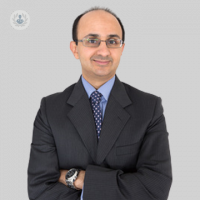Immunotherapy treatment for cancer: How does it work?
Written by:Patients with a range of cancer diagnoses may be recommended for immunotherapy treatment to fight the disease. In some cases, willing patients may also be accepted in clinical trials to learn more about this type of therapy and its impact and effectiveness against cancer.
In this expert guide to immunotherapy, leading consultant medical oncologist Dr Omar Khan sheds light on how the treatment works and how its progress is assessed, and also offers guidance on participating in clinical trials.

How does immunotherapy work?
In a nutshell, when people develop cancers, the body often initiates an immune response to fight them. Sometimes that immune response is very effective, but cancers are very clever and they can hide from the immune system.
To do this, the cancers use proteins, which we call checkpoints. Our own tissues within our bodies don’t want to be attacked by the immune system and so the body also employs checkpoints on our cells. The cancer uses these same checkpoints to prevent itself from being attacked and recognised by the immune system. In essence, immunotherapy blocks these proteins and enables the body’s immune response to be more active, allowing it to attack and hopefully kill some of the cancer cells.
Is it safe?
Immunotherapy is safe for many people and up to around a third of patients will have very few or no side effects. However, in a small proportion of patients, there can be more severe side effects. On the whole, immunotherapy tends to be safer and easier for the patient to cope with than chemotherapy.
Immunotherapy can cause side effects because the immune system can sometimes start to cause inflammation and attack healthy tissues as well. These are known as auto-immune side effects. In most cases, however, we are able to manage and then reverse these side effects successfully. Occasionally, they can be much more severe and therefore stopping the treatment is the safest thing to do.
How are clinical trials for immunotherapy different from other treatments?
In most cases, clinical trials for immunotherapy don’t differ greatly from other treatments. An important point about immunotherapy is that it can sometimes take a little bit longer to see the full benefits of the treatment compared to chemotherapy, for example. For other types of clinical trials, such as chemotherapy, we have a fairly quick standard turnaround with results. Typically, patients follow the treatment for a given period and undergo a scan six or 12 weeks later. This will show if the tumour has shrunk and responded to the treatment, and any improvements in their symptoms are also assessed.
With immunotherapy, the end points are similar but sometimes it can take a number of months to see the full benefits of the treatment. Therefore, a lot of clinical trials in this area are designed to reflect a longer timescale, as the desired results are unlikely to be seen very early on during the treatment. In the earlier stages of the treatment, it is possible that there has been no changes to the tumour or that it may even be continuing to increase in size. Nonetheless, we may decide to continue with the treatment especially if the person isn't having too many side effects from it and there is no obvious clinical deterioration in their condition.
Should I join a clinical trial?
Joining a clinical trial must, of course, be an individual choice. Most clinical trials are conducted for the benefits of patients, but the specific aim of each trial is different. In some trials, a treatment is administered so that it can be compared to other standard treatments that are used widely. Other clinical trials investigate the effects of individual drugs on a patient, including how they tolerate different dosages.
I believe that making a decision about entering a clinical trial must be an individual one. The advantages of taking part in research are that you are not only potentially helping yourself, but also the wider scientific community and future patients.
The disadvantages might be that you may be given the placebo in the trial or you may not get any benefit from the treatment, meaning you might have to move on to other treatment options. In most cases, you are monitored more closely when you're on a clinical trial, but that may be inconvenient as you will likely have extra hospital visits, tests or biopsies. Whenever someone has decided to take part in a trial, it is good practice to ensure that they fully understand the trial and have taken a careful decision over time about their participation.
What happens during treatment?
Most immunotherapy treatments are given intravenously through a cannula or a line. Depending on the drug being used, it may be given every two, three, or six weeks. The infusions usually don't take very long (perhaps an hour or so) and most people feel well during the procedure. Infusions are administered on an outpatient basis, or sometimes even within your own home.
The treatment is usually continued as long as it benefits the patient without causing any unacceptable side effects, although in a few cases immunotherapy is given in a fixed-term course. The patient who's having the treatment will also have blood tests intermittently to check that all of their parameters are normal and that it's safe for them to carry on. Additionally, around every twelve weeks or so, depending on the type of immunotherapy they're receiving, the patient would also have a scan to evaluate the effectiveness of the treatment as well as regular consultations with their oncologist.
How long does immunotherapy take to work?
The time it takes immunotherapy treatment to be effective varies. Some patients get immediate benefits within a few weeks, but more often it takes a number of weeks to see the full benefit. Depending on the type of tumour and treatment, it can sometimes take three or four months before people see some benefit. In this case, benefit refers to a reduction in the bulk or the size of the tumour but also an improvement in the patient’s symptoms and their wellbeing.
In many cases, we may just see a stabilisation of the disease where the cancer stops growing but doesn’t shrink. As long as the person is well, and they don't have too many side effects from the treatment, that can also be a successful outcome.
What if immunotherapy doesn't work?
Unfortunately, immunotherapy doesn’t work in some cases and there may be a number of reasons for that. It might be because their particular type of cancer doesn’t respond to the treatment at all. In other cases, the treatment can be effective initially but later stops working as the patient develops a resistance. At that point, the patient who's receiving the treatment will have a consultation with their oncologist who will explain what is happening and then discuss other treatment options, such as chemotherapy, other targeted therapies or possibly participation in clinical trials.
Currently, there is a lot of research taking place to investigate why some patients are resistant to certain immunotherapy treatments and also why resistance develops. If the patient is interested in participating in a clinical trial, the oncologist can refer them on as is appropriate.
If you would like to book a consultation with Dr Omar Khan or wish to learn more about him, you can do so by visiting his Top Doctors profile today.


